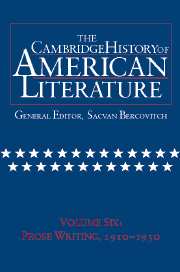Book contents
- Frontmatter
- Introduction
- A Cultural History of the Modern American Novel: Introduction
- 1 A Dream City, Lyric Years, and a Great War
- 2 Fiction in a Tme of Plenty
- 1 When the War Was Over: the Return of Detachment
- 2 The “Jazz Age” and the “Lost Generation” Revisited
- 3 The Perils of Plenty, or How The Twenties Acquired a Paranoid Tilt
- 4 Disenchantment, Flight, and The Rise of Professionalism in an Age of Plenty
- 5 Class, Power, and Violence in a New Age
- 6 The Fear of Feminization and The Logic of Modest Ambition
- 7 Marginality and Authority / Race, Gender, and Region
- 8 War as Metaphor: The Example of Ernest Hemingway
- 3 The Fate of Writing During the Great Depression
- Fictions of the Harlem Renaissance
- Ethnic Modernism
- Chronology
- Bibliography
- Index
8 - War as Metaphor: The Example of Ernest Hemingway
from 2 - Fiction in a Tme of Plenty
Published online by Cambridge University Press: 28 March 2008
- Frontmatter
- Introduction
- A Cultural History of the Modern American Novel: Introduction
- 1 A Dream City, Lyric Years, and a Great War
- 2 Fiction in a Tme of Plenty
- 1 When the War Was Over: the Return of Detachment
- 2 The “Jazz Age” and the “Lost Generation” Revisited
- 3 The Perils of Plenty, or How The Twenties Acquired a Paranoid Tilt
- 4 Disenchantment, Flight, and The Rise of Professionalism in an Age of Plenty
- 5 Class, Power, and Violence in a New Age
- 6 The Fear of Feminization and The Logic of Modest Ambition
- 7 Marginality and Authority / Race, Gender, and Region
- 8 War as Metaphor: The Example of Ernest Hemingway
- 3 The Fate of Writing During the Great Depression
- Fictions of the Harlem Renaissance
- Ethnic Modernism
- Chronology
- Bibliography
- Index
Summary
Writers whose art drew more from the customs and dialects of a region – as, for example, Jewett’s and Frost’s did from New England, Anderson’s and Lewis’s did from the Midwest, and Faulkner’s did from the South – had their own reasons for resisting New York. Even those who came to regard New York as a second home – as both Fitzgerald, born in St. Paul, Minnesota, and Langston Hughes, born in Joplin, Missouri, did at times, and as Anzia Yezierska, born in Plinsk, Poland, did more completely – continued to draw sustenance from their memories of the provincial cultures that they carried with them. Writers from the South carried the additional burden of a history haunted by slavery, guilt, poverty, and defeat, and nothing that happened in the twenties lightened their load. To Mencken, who made infrequent use of understatement, the Midwest was a “forlorn country” of yokels and hypocrites. The “truths” that Carol Kennicott, protagonist of Main Street (1920), discovers were, Mencken reported, simply the truth: “the contentment” of the Midwest was “the enchantment of the quite dead.” The Midwest was “negation,” “prohibition,” and “slavery”: it was “dullness made God.” But Mencken spoke for the nation in making the South his favorite target of ridicule. The South epitomized the “idiocies of the Bible Belt,” he said, surpassing in hypocrisy and benightedness every civilization in history.
- Type
- Chapter
- Information
- The Cambridge History of American Literature , pp. 170 - 183Publisher: Cambridge University PressPrint publication year: 2002

